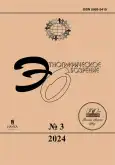On trade in europe: anthropologists speak
- Autores: Fais-Leutskaia O.D.1, Novik A.A.2
-
Afiliações:
- Institute of Ethnology and Anthropology, Russian Academy of Sciences
- Peter the Great Museum of Anthropology and Ethnography (Kunstkamera), Russian Academy of Sciences
- Edição: Nº 3 (2024)
- Páginas: 5-12
- Seção: Special theme of the issue: Humans buying and selling: anthropology of trade (people, goods, structures, relationships)
- URL: https://rjsvd.com/0869-5415/article/view/672486
- DOI: https://doi.org/10.31857/S0869541524030013
- EDN: https://elibrary.ru/BRVRUX
- ID: 672486
Citar
Texto integral
Resumo
This article is an introduction to the issue’s special theme on “Humans Buying and Selling: Anthropology of Trade (People, Goods, Structures, Relationships)”, featuring contributions by Svetlana Sidneva, Alexander Novik, Armando Maxia, Oxana Fais-Leutskaia, Julia Butschatskaja, and Irina Kucherova. The authors discuss the current state of trade as economic activity in a number of European regions, examining the local specificities of trade operations and their functioning, the symbolism of goods, the preservation of archaic traditional elements of “old ways of trade”, the human relationships of participants in these “games of exchange”, and other aspects of trade as a cultural phenomenon. Due to the fact that trade, especially in the context of modern developed societies, is infrequently considered as an object of anthropological research, while available studies in the vein of economic anthropology are mostly concerned with realities of the “Global South” or societies with “mixed economy”, these contributions are based on actual fieldwork material and represent an attempt at ethnographic reconstruction and anthropological analysis of trade through particular cases of European regions, such as Greece, Kosovo, Sardinia, Sicily, Germany, and Iceland. The contributors employ novel approaches to demonstrate the ongoing relevance of this theme in the context of contemporary culture.
Palavras-chave
Texto integral
Sobre autores
Oxana Fais-Leutskaia
Institute of Ethnology and Anthropology, Russian Academy of Sciences
Email: oxana-fais@yandex.ru
ORCID ID: 0000-0002-2757-2434
к. и. н., старший научный сотрудник центра европейских исследований
Rússia, 32-a Leninsky prospect, Moscow, 119991Alexander Novik
Peter the Great Museum of Anthropology and Ethnography (Kunstkamera), Russian Academy of Sciences
Autor responsável pela correspondência
Email: njual@mail.ru
ORCID ID: 0000-0002-1123-1109
к. и. н., заведующий центром европейских исследований, ведущий научный сотрудник
Rússia, 3 University Emb., St. Petersburg, 199034Bibliografia
- Aime, M. 2002. La casa di nessuno. Mercati in Africa occidentale [Nobody’s House: Markets in West Africa]. Torino: Bollati Boringhieri.
- Appadurai, A. 1986. The Social Life of Things. New York: Cambridge University Press.
- Appadurai, A. 1996. Modernity at Large: Cultural Dimensions of Globalization. Minneapolis: University of Minnesota Press.
- Baumol, W.J., R.E. Litan, and C.J. Schramm. 2009. Good Capitalism, Bad Capitalism, and the Economics of Growth and Prosperity. Yale: Yale University Press.
- Braudel, F. 1979. Civilisation matérielle, économie et capitalisme, XV–XVIII-e siècle [Material Civilization, Economy and Capitalism: 15th-18th Centuries]. Vol. 1, Les Structures du quotidien: le possible et l’impossible [The Structures of Everyday Life: The Possible and the Impossible]. Paris: Armand Colin.
- Braudel, F. 1979. Civilisation matérielle, économie et capitalisme, XV–XVIII-e siècle [Material Civilization, Economy and Capitalism: 15th-18th Centuries]. Vol. II, Les Jeux l’échange [The Exchange Games]. Paris: Armand Colin.
- Braudel, F. 1979. Civilisation matérielle, économie et capitalisme, XV–XVIII-e siècle [Material Civilization, Economy and Capitalism: 15th-18th Centuries]. Vol. III, Le Temps du monde [World Time]. Paris: Armand Colin.
- Brøgger, B. 2009. Economic Anthropology, Trade and Innovation. Social Anthropology 17 (3): 318–333. https://doi.org/10.1111/j.1469–8676.2009.00072.x
- Clark, G. 1994. Onions Are My Husband: Survival and Accumulation by West African Market Women. Chicago: University of Chicago Press.
- Curtin, P.D. 1988. Mercanti. Commercio e cultura dall’antichità al XIX secolo [Merchants: Trade and Culture from Antiquity to the 20th Century]. Roma: Laterza.
- Duranti, A., ed. 2018. Parole chiave su linguaggio e cultura. Un lessico per le scienze umane [Keywords on Language and Culture: A Lexicon for Science]. Sesto San Giovanni: Meltemi.
- Eliade, M., D.M. Cosi, and L. Saibene, eds. 2019. Dizionario degli dei. Mediterraneo, Eurasia, Estremo Oriente [Dictionary of the Gods: Mediterranean, Eurasia, Far East]. Milano: Jaca Book.
- Fais-Leutskaia, O.D. 2023. Sagry v Italii: sovremennye ekonomicheskie i sotsial’nye aspekty srednevekovoi traditsii [Sagri in Italy: Modern Economic and Social Aspects of the Medieval Tradition]. Vestnik antropologii 3: 144–164.
- Fusaro, M. 2021. Reti commerciali e traffici globali in età moderna [Global Trade and Trade Networks in the Modern Age]. Roma: Laterza.
- Geertz, C. 1978. Bazaar Economy: Information and Search in Peasant Marketing. American Economic Review 68 (2): 28–32.
- Geertz, C. 1979. Suq: The Bazaar Economy of Sefrou. In Meaning and Order in Moroccan Society, edited by C. Geertz, H. Geertz, and L. Rosen, 123–314. New York: Cambridge University Press.
- Gudeman, S.F. 2001. The Anthropology of Economy: Community, Market, and Culture. Malden: Blackwell.
- Hann, C., and K. Hart. 2011. Economic Anthropology: History, Ethnography, Сritique. Cambridge: Polity Press.
- Lowder, G.G. 1984. Studies in Volcanic Petrology. Vol. I, Talasea, New Guinea; Vol. II, Southwest Utah. Berkeley: University of California.
- Lyon, S. 2021. Anthropological Perspectives on Fair Trade. Oxford. 29.10.2021. https://oxfordre.com/anthropology/display/10.1093/acrefore/9780190854584.001.0001/acrefore-9780190854584-e-521; jsessionid=C3F8CED0618E9BDC5254F2DCC59277F5
- Novik, A.A. 2023. Bazar i diukian, yarmarka i market: evoliutsiia torgovli v Albanii v nachale XXI v. [Bazaar and Dyukyan, Fair and Market: The Evolution of Trade in Albania at the Beginning of the 21st Century]. Vestnik antropologii 3: 121–143. https://doi.org/10.33876/2311–0546/2023–3/121–143
- Pallante, G. 1973. Creta e Micene, i misteri dell’archeologia [Crete and Mycenae, the Mysteries of Archaeology]. Milano: De Vecchi.
- Peyronel, L. 2008. Storia e archeologia del commercio nell’Oriente antico [History and Archaeology of Trade in the Ancient East]. Roma: Carocci.
- Plattner, S., ed. 1989. Economic Anthropology. Stanford: Stanford University Press.
- Shevlyakova, D.A. 2023. Kommertsializatsiia istoricheskoi pamiati v nazvaniiakh ital’ianskikh vin nachala XXI v. [Commercialization of Historical Memory in the Names of Italian Wines at the Beginning of the 21st Century]. Vestnik antropologii 3: 165–183.
- Smith, R.L. 2008. Premodern Trade in World History. London: Routledge.
- Stephan, E. 1977. Il movimento commerciale nell’antichità [The Trade Movement in Antiquity]. Sala Bolognese (Bo): Ovens.
- Trager, L. 1981. Customers and Creditors: Variations in Economic Personalism in a Nigerian Marketing System. Ethnology 20 (2): 133–146.
Arquivos suplementares










